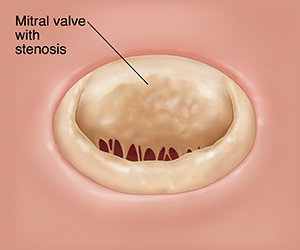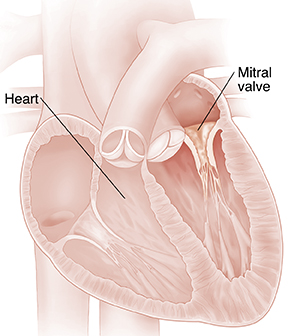A
B
C
D
E
F
G
H
I
J
K
L
M
N
O
P
Q
R
S
T
U
V
W
X
Y
Z
Back to Intro
Click a letter to see a list of medical procedures beginning with that letter.
Click 'Back to Intro' to return to the beginning of this section.
Heart Valve Problems: Mitral Valve Stenosis
Mitral stenosis means the mitral valve stiffens and doesn’t open all the way. When it can't fully open, blood must move through a smaller opening. In severe cases, it can affect other organs and the rest of the body. Fluid and pressure can build up in the lungs. This can lead to coughing and breathing problems. Problems with the mitral valve can also cause a fast or irregular heartbeat (palpitations). Over time, mitral stenosis may slowly get worse.
 |
| Open mitral valve with stenosis (viewed from above). |
 |
| Cross section of heart showing mitral valve stenosis. |
Possible causes
Mitral stenosis is most often caused by rheumatic fever. This illness can lead to an inflammation that damages the heart valves. Other causes include mitral valve prolapse and heart defects from birth (congenital). Although pregnancy doesn’t cause mitral stenosis, a person may first get symptoms of mitral stenosis during pregnancy if undiagnosed mitral stenosis is present. This is because the amount of blood their heart has to move has increased.
Treating mitral valve stenosis
If you don't have symptoms, you usually don't need treatment. If symptoms occur, your healthcare provider may prescribe medicines to help ease them. If the stenosis is severe, a procedure called balloon valvuloplasty can stretch the opening of the valve for temporary relief.
Heart surgery with valve replacement using either a tissue or mechanical valve is often the best long-term choice to manage this problem.
Online Medical Reviewer:
Callie Tayrien RN MSN
Online Medical Reviewer:
Stacey Wojcik MBA BSN RN
Online Medical Reviewer:
Steven Kang MD
Date Last Reviewed:
3/1/2022
© 2000-2024 The StayWell Company, LLC. All rights reserved. This information is not intended as a substitute for professional medical care. Always follow your healthcare professional's instructions.